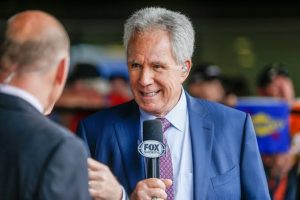
Larry Bird, the legendary former NBA player known for his time with the Boston Celtics, is a beloved figure in the world of basketball, and any major updates regarding his health or life would be widely reported by reputable media organizations.
It’s not uncommon for rumors and false information to circulate on social media, which can cause confusion and concern. I encourage you to verify the information through established news sources before drawing any conclusions.
typically keeps the focus largely on Laker land. But the Showtime Lakers’ ’80s dynasty wouldn’t be what it was without the Boston Celtics. Some of the show’s best scenes are the conversational jousting between Celtics coach Red Auerbach (Michael Chiklis) and Lakers owner Jerry Buss (John C. Reilly). In the latest episode of Winning Time, the show gives the deepest look yet into the life of a character not part of the Lakers organization, as it delves into a trauma that forever shaped Celtics star Larry Bird (Sean Patrick Small).
In 1 1/2 seasons of Winning Time, Bird hasn’t said much outside of taunting Magic Johnson (Quincy Isaiah) on the court and in his mind. When the Boston Celtics celebrated winning the 1981 NBA Finals the year after the Lakers won, Bird’s beady-eyed stare into the camera looked like it was piercing through the national TV audience just to hone in on hitting Johnson where it hurt. And Johnson’s disgust was so visceral that it felt like smoke from Bird’s celebratory cigar wafted through his TV screen into his face. The show builds Bird up to be an emotionless robot, designed by the basketball gods to get buckets and rip out hearts. In reality, he was a man of flesh and bones—and a heart twisted by dysfunctional family life.
Bird was born to Georgia and Claude Joseph “Joe” Bird in West Baden Springs, Indiana. The family wallowed in poverty for years, inspiring Larry to pursue basketball to change their lives. His mother has yet to appear in the show, but Larry has been on record over the years, noting how much his mother sacrificed and worked multiple jobs to provide for him and his siblings. His father, Joe (Mac Brandt), made his Winning Time debut, and by the end of the episode, he was a central figure in one of the saddest story arcs in the history of the series.
Not much is publicly known about Joe Bird outside of his connection to the basketball legend he and Georgia produced. Born in the French Lick town of Indiana, where he raised Larry, Joe was a construction worker who also served in the Korean War. While Joe was proud of the basketball star his son became, Larry’s early basketball career wasn’t a top priority for him. Larry had said his dad didn’t go to many of his basketball games when the Boston Celtics legend played in high school, including when Larry broke the Orange County scoring record. To Joe’s credit, he did walk from home to the arena where his son was making history because the family didn’t own a car, and Larry’s uncle called Joe at halftime to implore him to find a way to watch his son’s historical performance.
Joe also wasn’t the best partner to Larry’s mother. Joe and Georgia divorced while Larry was in high school and had an acrimonious relationship, partly due to Joe’s lateness on child support payments. Joe also suffered from alcoholism and had a hard time keeping a job. In a memoir, Georgia’s sister, Virginia Smith, spoke about Joe’s physical abuse, recounting when Joe left Georgia with a black eye while she was pregnant. Larry’s relationship with his father was complicated until Joe’s tragic death while Larry was still in high school.
In February 1975, Joe surprisingly shot himself in the head with a shotgun after a police officer showed up at his home looking for child support. Joe told the officer to return later in the afternoon. According to Indianapolis Monthly, shortly before he took his own life, Joe called his ex-wife to tell her the family would be better without him. Moments after putting the phone down, Joe died by suicide.
Larry’s best friends recall the basketball phenom not being open to talking much about his father’s death, a stance that continued for decades. Larry has been on record detailing his father’s influence, but has rarely discussed his death publicly. In a 2015 interview with Indianapolis Monthly, Bird opened up about his disappointment in his father’s decision to take his life, a feeling that hadn’t changed in the decades since. “I sort of always felt my dad gave up on not only himself but us kids,” Bird said. “I still had two younger brothers at home and a mom. That’s the way I looked at it then and the way I look at it now. I handled it pretty good, I think.”





